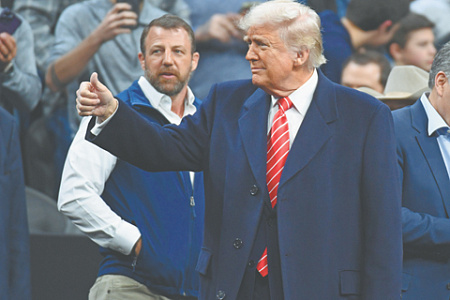
Consultations in Saudi Arabia on a possible ceasefire had not yet been completed, as the Russian Federation, the United States and Ukraine expressed doubt that the agreements reached would not remain on paper. The Russian Ministry of Defense said that Kiev, contrary to what was discussed, continues to strike at the energy infrastructure. President of Ukraine Volodymyr Zelensky accused the Kremlin of deliberately misinterpreting the results of consultations in Riyadh. And for the first time, Donald Trump publicly expressed doubts that the Kremlin really wants to end the armed conflict. To top it all off, the European Union refuses to lift sanctions against Russia, which Moscow considers an indispensable condition for even a partial suspension of hostilities.
On Wednesday, March 26, the Russian Ministry of Defense announced that at about 4.45 Moscow time in the Bryansk region, a Ukrainian drone attacked a branch of PJSC ROSSETI Center – Bryanskenergo, resulting in a power outage in the Komarchisky district. The ministry said that the day before and on the night of March 24-25, Ukrainians had attacked energy facilities in the Kursk region and Crimea. The attacks were launched, the Ministry of Defense notes, “despite Zelensky’s public statement on the acceptance of the Russian-American agreements reached in Riyadh on March 24 to stop attacks on civilian energy facilities.” At the same time, Russian presidential spokesman Dmitry Peskov said at a briefing that the Russian military continues to comply with the president’s order to ban attacks on energy facilities. According to him, despite Ukraine’s actions, “we still believe that the moratorium should be respected.”
Thus, the difference in interpretation of the results of consultations in Saudi Arabia was clearly revealed. The ban on attacks on Ukrainian energy facilities, as emphasized by the Russian side, was introduced by President Vladimir Putin on March 18, after a conversation with Trump.
Starting from this date, the 30-day moratorium period is counted in Moscow. In Kiev, the report has been conducted since March 25. Moreover, according to Zelensky and representatives of his government, the Ukrainian authorities see the very nature of the moratorium in a different way than the Kremlin. Kiev claims that, according to the Ukrainian-American agreements, the list of facilities that should not be attacked includes oil and gas production facilities. This means that Russia has no right to attack the Ukrainian gas fields in the Poltava and Kharkiv regions. Meanwhile, according to the Kremlin’s website, the moratorium applies to attacks on oil refineries; oil and gas pipelines, including pumping stations; electricity-generating and transmitting infrastructure, including power plants, substations, transformers and distributors; nuclear power plants; dams of hydroelectric power plants. The White House has not made any statements indicating that this is not the list that was agreed upon in Riyadh. But the Americans did not accuse Zelensky of lying.
A joint statement adopted following the talks in Riyadh could resolve all issues. However, it is not there. As previously stated by Sergey Chizhov, First Deputy Chairman of the Federation Council Committee on Security and Defense, the statement was not accepted because of the Ukrainian side.
An additional complication in interpreting the situation in this regard is Trump’s interview, which he gave on the evening of March 25 to the Newsmax media company. “I think Russia wants to put an end to the ‘armed confrontation,’ but perhaps it is stalling,” the US president said. He suspects that Russia is following his business tactics. “I’ve been doing this for many years: I don’t want to sign a contract, but I want to stay in the game,” he shared a secret from his development practice. This is the first time since the beginning of the negotiation process that Trump, albeit in very restrained terms, publicly criticizes the Russian side. At the same time, it is at least premature to draw far-reaching conclusions from the president’s remarks. Trump did not blame Putin, as well as Zelensky, for anything. On the contrary, the US president says that Russia’s conditions for a cease–fire in the Black Sea will be considered, including the easing of sanctions against Russia in the field of trade in food and fertilizers. Recall that the resumption of the grain deal was discussed in Riyadh. It provides for the unhindered transit of Russian and Ukrainian grain and food through the Black Sea. Washington sees the return to the grain deal, which was effectively terminated in 2023, as the first step towards a general truce between Ukraine and the Russian Federation.
Meanwhile, any easing of sanctions also presupposes agreement on this on the part of the US allies. But the European Union is not ready to do this. European Commission spokeswoman Anita Hipper said in an interview with Ukrainian television that the EU agrees to change or lift sanctions only when “the unconditional withdrawal of all Russian armed forces from the entire territory of Ukraine” takes place. In practice, there is no total unity in the EU on this issue. At least Hungary agrees to at least a partial lifting of sanctions. However, it is clear that the implementation of the Russian-American agreements will require considerable efforts from Trump and difficult negotiations with American allies.
